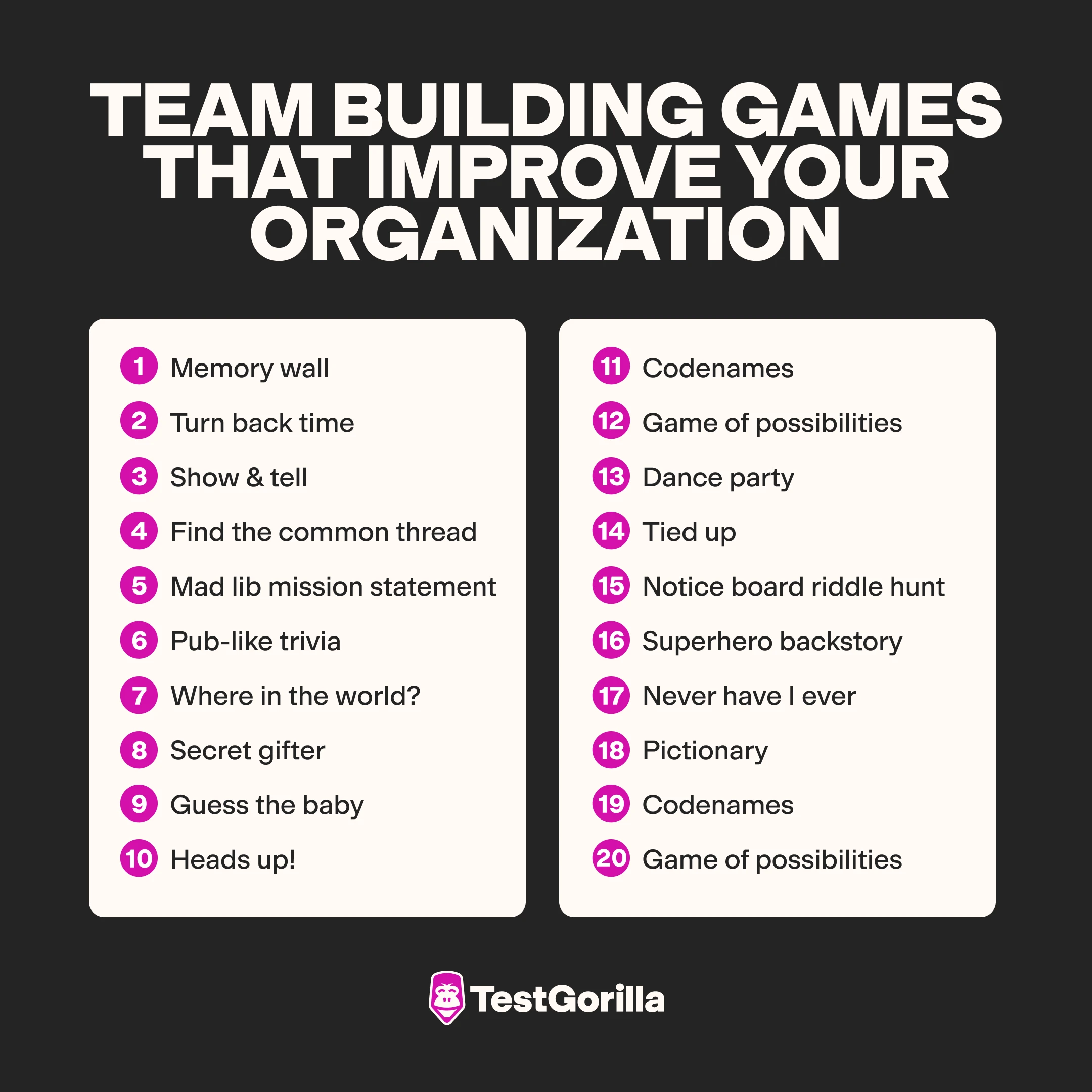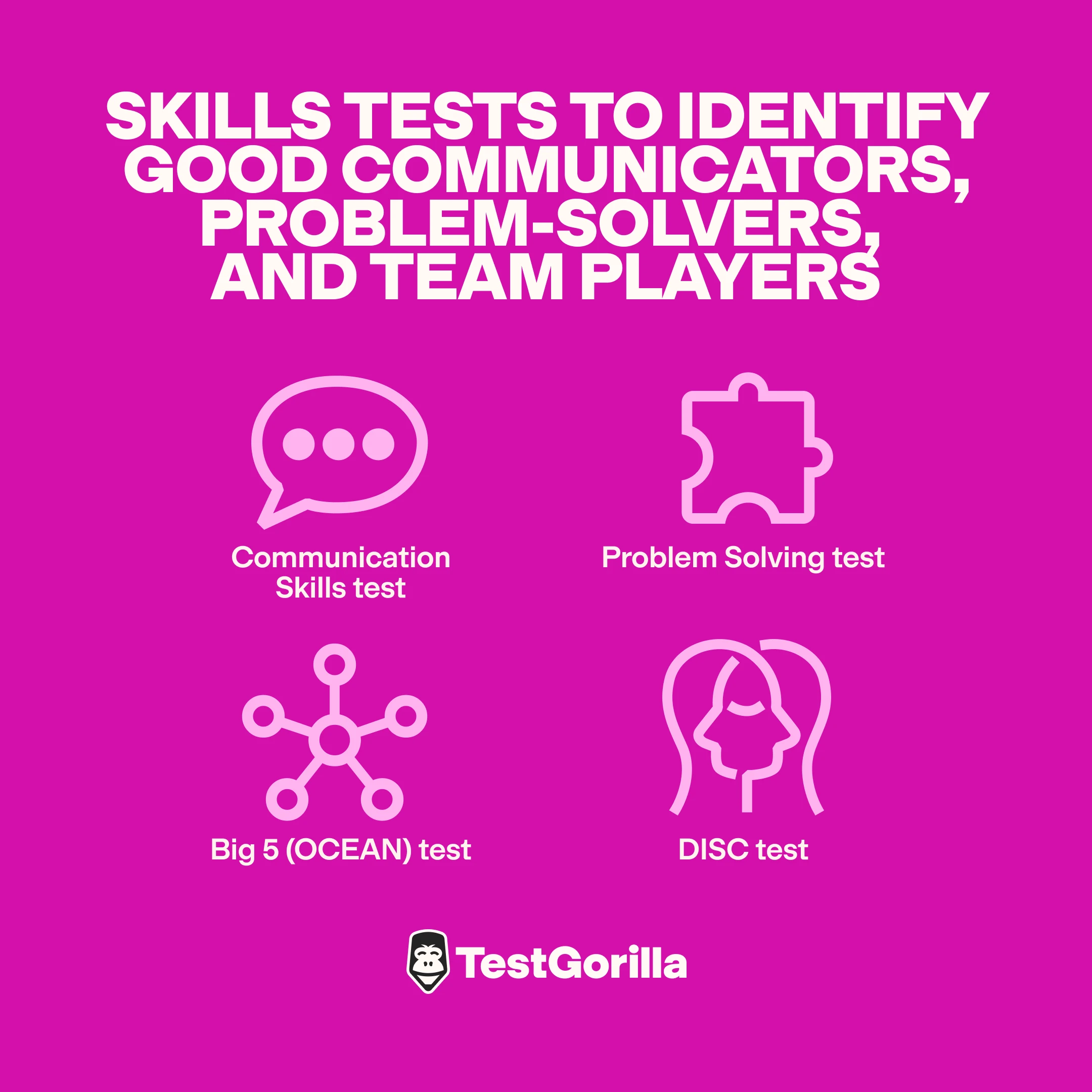20 team building games your team will love
If you've ever tried to build a strong team, you know it’s more than just putting a group of people in a room and hoping for the best. You need to have clear expectations, make sure prospective team members fit the team's culture, and build trust and rapport among current members. One way to do the latter is through team-building games.
To inspire you, we’ve put together a list of fun team-building games that will spark creativity, improve communication, and build trust in your team. So you can make the most of your team’s potential, we'll also show you how skills assessments can help you find and build the key soft skills needed for a strong, effective team.
Key takeaways
Use engaging team-building games to improve teamwork, communication, and trust within your team.
Leverage TestGorilla assessments to identify candidates with strong teamwork skills and build more effective teams.
Use data-driven assessments to hire and create cohesive and productive teams.
The psychology of team building
Team building is rooted in several psychological principles that explain how and why people work better together. One key theory is social identity theory, which suggests that people bond when they feel they belong to a group. This sense of belonging fosters loyalty and teamwork, which is essential for a strong team dynamic (Tajfel & Turner, 1979). Team-building games can help create this sense of belonging by encouraging members to discover what they share.
Another important concept is Tuckman’s Stages of Group Development, which outlines the phases teams go through: forming, storming, norming, performing, and adjourning. Understanding these stages helps team leaders guide their teams to success by addressing issues at each phase. Team-building games are particularly helpful in the forming and norming phases because they build connections and help team members learn to work together effectively.
Finally, interpersonal trust theory highlights the importance of trust for effective collaboration. Trust allows team members to communicate openly, share ideas, and take risks without fear of negative consequences (Mayer, Davis, & Schoorman, 1995). Some games foster trust by encouraging vulnerability and thoughtful gestures.
The best insights on HR and recruitment, delivered to your inbox.
Biweekly updates. No spam. Unsubscribe any time.
Team building games that improve your organization
Here is a list of team-building games you can use to improve your team synergy and how to play them in remote and on-site settings:
1. Memory wall
Set up a whiteboard – digital whiteboards for remote teams – and write down themes like “Best Work Achievement,” “Funniest Team Moment,” or “Most Memorable Celebration.” Have everyone write down their memories and share them one by one. This is a great way to reflect on positive experiences and build emotional connections within your team.
2. Turn back time
Gather the team and ask each person to think of a special memory they’d like to relive. You can do this activity in a virtual or physical meeting room. After a few minutes of reflection, have everyone share their memory. This game encourages everyone to be open, builds trust, and helps people feel connected by sharing personal stories, which fosters creativity and understanding.
3. Show and tell
Ask each team member to bring or share something important to them—a hobby, an achievement, or a personal story. After each presentation, open the floor for questions.
By allowing each person to share something meaningful, you’re encouraging active listening, empathy, and understanding — important skills for teamwork.
Further reading: The art of listening: How to become an active listener
4. Find the common thread
Divide the team into small groups and have them find something they all have in common. Once they do, they create a fun stereotype and act it out. This helps break down barriers, encourages bonding, and promotes creative thinking by finding shared connections.
5. Mad lib mission statement
Take your company’s mission statement and remove some key nouns, verbs, and adjectives. Fill in the blanks with random words and read the results aloud for a good laugh. Not only does it lighten the mood, but it also helps the team feel more connected to your company’s values.
6. Pub-like trivia
Create trivia questions on various topics, including company history or team fun facts. Split the team into groups and see who can answer the most questions correctly. This game encourages friendly competition and helps people bond by communicating and working together to answer questions.
7. Where in the world?
Use GeoGuessr or a similar platform to share a random location and let the team guess where it is. This game encourages teamwork by having everyone discuss their ideas, which promotes communication and learning about each other's experiences.
8. Secret gifter
Assign each team member a person to buy a small, secret gift for. When exchanging gifts, everyone tries to guess who their secret gifter was. This encourages thoughtfulness and helps team members get to know each other better through meaningful gestures.
9. Guess the baby
Have each team member submit a baby photo, then display them for everyone to guess who’s who. This game creates personal connections by sharing stories from childhood, building empathy and making the team feel closer.
💡Tip! Incorporating games that encourage empathy and self-awareness helps improve emotional connections among team members because it prompts participants to showcase their emotional intelligence.
10. Heads up!
Use the “Heads Up!” app, where one person holds the phone on their forehead and others give clues to help them guess the word. This game encourages quick thinking and improves communication as everyone works together under time pressure.
11. Codenames
Divide into two teams and play the online version of Codenames. A spymaster gives one-word clues, and team members try to guess the related words. This game encourages strategic thinking and teamwork as players collaborate to solve the clues.
12. Game of possibilities
Give each person a random object and ask them to demonstrate a creative use for it while others guess what it is. This game encourages out-of-the-box thinking and sparks creativity as everyone comes up with unique uses for common items.
13. Dance party
Use an app like “Just Dance” or have everyone join a video call for a dance party. The dance leader guides the moves while everyone follows. This activity is energetic and fun, helping the team bond and build creativity through movement.
14. Tied up
Pair up team members and tie their hands together (metaphorically, if remote) to complete a task using shared digital tools. This game encourages problem-solving and clear communication as they navigate the challenge together.
15. Notice board riddle hunt
Post riddles or clues, and have teams race to find the answers. This scavenger hunt-style game encourages problem-solving and teamwork as members collaborate to solve each clue.
16. Superhero backstory
Have each team member create a superhero origin story for a colleague based on their work or qualities. This fun activity taps into creativity and humor, helping the team bond over shared, imaginative narratives.
17. Never have I ever
Each player takes turns sharing something they’ve never done. Anyone who has done it must raise their hand. This lighthearted game helps team members learn interesting things about each other, building communication and fostering connection.
18. Pictionary
Have one team member draw a word or phrase while the rest guess what it is. This game encourages creativity and effective communication as the team collaborates to solve each drawing.
19. Codenames
Team members must work together to solve clues and guess words. You can use the online version of Codenames for remote teams. This game encourages problem-solving and creative thinking as participants collaborate to identify the correct answers.
20. Game of possibilities
Participants think of a creative new way to use an everyday object and demonstrate it to the team. This activity encourages quick thinking and creativity, as everyone comes up with unique ideas and shares them with the group.
Level up your remote hiring process with talent assessments
Team-building games are a great way to bring teams closer and improve how they work together, but there are other techniques to add to the mix. This includes using data-driven assessments in your hiring process to identify key soft skills like communication, collaboration, and creativity – all crucial for building a successful team.
A talent assessment platform like TestGorilla is the perfect tool for doing this. You can choose up to five tests from our library of over 400 tests to make sure that new hires have the soft skills as well as the hard skills needed for team success.
Our Communication Skills test and Problem Solving test can help you identify candidates who are good communicators, problem-solvers, and team players—all essential traits for a strong and productive team.
Further reading: Your hiring team’s guide to workplace communication tests
You can take your assessment a step further with personality tests like the Big Five (OCEAN) Personality Test and the DISC Personality Test. These tell you more about a candidate's ability to collaborate, communicate, and work well within a team.
They also help you understand personality traits that align with your team dynamics, ensuring you bring in individuals who are naturally inclined to contribute positively to a cohesive work environment.
Build stronger teams with TestGorilla
Team-building games can improve communication, build trust, and strengthen connections within your team, ultimately creating a more productive and happy work environment.
But you can also improve team cohesion when hiring new members. One of the best ways to do this is to use a pre-employment screening platform like TestGorilla. We offer a wide array of tests for hard and soft skills to help you find your perfect candidates.
Ready to build your strongest team yet? Check out our free plan, schedule a demo, or take a product tour to see how TestGorilla can help you improve your remote hiring and team-building strategies.
FAQs
What are the four main types of team-building activities?
The four main types of team-building activities are:
Communication activities: Focused on improving how team members talk and listen to each other.
Problem-solving activities: Designed to encourage creative thinking and collaborative solutions to challenges.
Collaboration activities: Help team members work together more effectively by completing tasks as a group.
Trust-building activities: Aim to build trust among team members through exercises that require vulnerability and support.
What are the 5 P's of team building?
The five P's of team building are:
Purpose: Clearly defining the team's goals and why they matter.
People: Ensuring the right mix of skills and personalities in the team.
Plan: Establishing an action plan to achieve the team's objectives.
Processes: Setting up effective methods for communication, decision-making, and problem-solving.
Performance: Monitoring progress and providing feedback to keep the team on track.
These elements help teams stay focused, aligned, and effective in achieving their goals.
You've scrolled this far
Why not try TestGorilla for free, and see what happens when you put skills first.




















